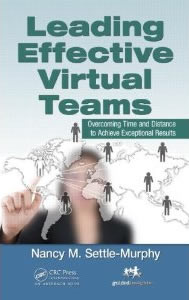Just because someone works virtually doesn’t mean that person really has what it takes to collaborate successfully. In fact, many who work remotely are poorly suited to make the connections they really need to thrive.
In this edition of Communiqué, we look at characteristics that make for a successful virtual collaborator, and those that may cause big problems for many remote workers. We recognize that some jobs don’t require a great deal of real collaboration to get work done, and that other jobs can be performed competently by the “lone wolf” who remains detached from colleagues. Here we focus on qualities that are especially important for those who rely on successful collaboration to shine.
- Social butterflies tend to thrive. The reason: They crave contact with others and are motivated to maintain connections with others, either virtually – through phone, email or social networking tools – or face-to-face whenever they can. Introverts who find it painful to stop and chat with an officemate may find it infinitely more difficult to cultivate social connections in a virtual world. Maintaining a deep, trusting connection with colleagues is tough for any of us who work virtually, but for someone who is reluctant or introverted, these deep bonds are almost impossible to create and keep up when working from afar.
- Excellent organizational skills a harbinger of success. Virtual workers have to be more self-motivated and disciplined than their office colleagues, since they don’t have the luxury of having someone drop in to remind them of an errant deadline or an urgent action. Virtual workers have to set up their own systems for reading, filing and accessing important content, performing tasks and reporting progress. Virtual workers also have to follow an established protocol related to the use of file-sharing, email or social networking tools. Those who are perpetually disorganized or need constant reminders will suffer for their shortcomings even more in a virtual world, with no one there to look over their shoulders.
- Ability to manage time across many dimensions. Virtual workers must be adept at managing their calendars and synching up with others, since conversations and meetings must be so well orchestrated. They need to be disciplined and realistic about keeping their own calendars, making sure they build in time for thinking, eating and moving about throughout the day. While some cram too many meetings into a single workday, forcing them to work after-hours or risk falling behind, others may take too much time “off” for non-work activities, simply because no one is watching. Those who have a realistic sense of how much time they need to get their work done will be far more productive than those who either can’t or won’t accurately estimate how much time they need to get work done.
- Willing and able to use a variety of tech tools with ease. Email and phone as the primary means of team communication are quickly giving way to other communications tools. Social networking apps, shared repositories, instant messaging, web meeting tools, blogs, wikis, telepresence -and more- have become commonplace for virtual teams. Some workers can choose the tool that best meets a particular need, and for others, their organizations have governing principles about the use of certain tools. Regardless, virtual workers have to be conversant about how tools work, and which works best in a given situation, and need to feel comfortable using those tools quickly and easily. Those who are slow to adapt to new communication tools may find themselves being left out of important online conversations or getting only a fraction of the information they need.
- Exceptionally sharp listening skills. People who work virtually miss the vital visual cues that accompany a colleague’s disappointment, frustration, elation or impatience. Virtual workers need to be able to hear verbal cues and read written clues to discern what’s really going on for others, much of which often goes unsaid. People from “high context” cultures, where both the context and the words themselves are considered as key parts of the overall message, tend to be more successful than those who take another’s words simply at face value. Those who don’t listen deeply, such as those who chronically multitask during team calls, may never get a sense of the thoughts and feelings that may make or break the success of a virtual team.
- Knows what to communicate, how and when. People who know how to organize their thoughts into cogent, concise messages have a significant advantage over their colleagues who struggle to put their ideas into writing. Knowing what medium works best for a particular message or a certain situation is a vital skill for a virtual worker who has few chances to make reparations if a message is misunderstood or misinterpreted. Those who insist on emails as the default communication mode, for example, may find themselves out of the loop pretty quickly if everyone else is sharing information across a variety of channels.
- Ignites own spark. People who can move ahead without a lot of direction or guidance on a day-to-day basis are far more likely to be successful in a virtual world, where workers must deal with a high degree of ambiguity and the absence of information, sometimes for long periods of time. Those who crave constant feedback or need frequent affirmation will stagnate easily and frequently in a virtual world.
Some managers don’t have the luxury of selecting only some of their workforce for virtual work. Where there is a choice, consider these qualities and attributes when deciding who will blaze the path for others to follow. Consider how your company’s training programs can cultivate some of the needed skills and competencies.




